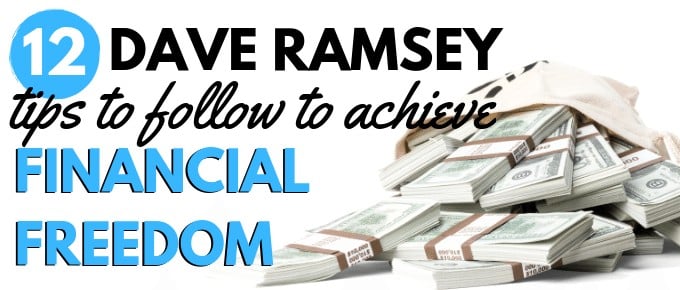
No matter how much of an uphill battle it can be at times, achieving financial stability is a goal that most people have. After all, the alternative of living paycheck to paycheck and struggling to scrape together the money to pay bills isn’t much fun.
Financial stability is something I’ve always worked hard to provide for my family. I live within my means, stick to a budget (as best I can,) make regular contributions to my savings account and regularly try to look for new ways to make extra money.
And thanks to following some of the top Dave Ramsey tips, I’ve been able to achieve my goal of financial stability.
Related: What is Financial Freedom?
Who Is Dave Ramsey?
Dave Ramsey is a financial expert and among America’s most trusted and well-known personalities on money and business. He’s also a radio host and has published more than five books, including Financial Peace, Complete Guide to Money, and his bestseller, Total Money Makeover.
One of his most well known concepts is known as “Dave Ramsey’s Baby Steps.” These “baby steps” that are easy and achievable, especially for families and individuals who aren’t high income earners. He offers practical knowledge as well as a customized approach for different situations. But take note that his advice is useful only if you have the heart to change your mindset and your lifestyle.
What’s even more remarkable about Dave Ramsey is that even though he lost everything he had at the age of 28, including his $4 million in real estate portfolio, he used that situation as a springboard to achieve even greater things, and now has a net worth of $55 million.
As is evidenced by his current net worth, he got back on track and rebuilt his finances. He then decided that he wanted to share his knowledge and inspire others through teaching. Dave Ramsey established The Lampo Group, LLC in 1992 but was rebranded as Ramsey Solutions in 2014. Now, he runs a multi-million-dollar firm and provides financial counseling.
Best Dave Ramsey Tips That Will Help You Achieve Financial Security

Now that you know how influential Ramsey is in the field of personal finance, let’s take a closer look at each of his best money tips. Are you currently in a tight financial situation and dream of achieving financial security? If yes, then continue reading as I will round up the best money tips from Dave Ramsey.
Let’s start with his famous “baby steps.”
Dave Ramsey’s Baby Steps
1. Pay off all consumer debt.
If you’re in a tight financial situation, giving away every penny you have to pay off all your debt sounds ridiculous. But according to Dave Ramsey, that’s the first thing you should do – pay back every person you owe money to.
It will be difficult and may take time, but once your slate is clean, you’ll realize it is the best decision you have ever made on your way to financial stability.
You can take any method you prefer as long as you are making progress.
However, he recommends using the debt snowball method, where you pay the smallest balance first (while still making the minimum repayment on your other debts) and then, once you’ve paid of a debt, add the money you were paying to that smaller debt the amount your paying for the next debt.
Regardless of which approach you choose to take, what’s important is you start paying off all your debt.
2. Save a $1000 emergency fund.

As the Boy Scouts always say – “Be Prepared.” Being prepared for unexpected financial emergencies is one of the keys to achieving financial security. As such, it’s wise to save an emergency fun.
Dave Ramsey suggests $1000 at least, but if you can do more, the better. This article shows you 17 ways you can make extra money to contribute to your emergency fund.
3. Save 3-6 months of expenses.
Still on the topic of being prepared – a $1000 emergency fund is important and a great achievement, but Dave Ramsey also recommends saving up enough money to cover 3-6 months of expenses, should you lose your job or an event occur that makes you unable to work.
4. Pay off your mortgage early.
So you’ve paid off all your consumer debt – great job! The next step is to pay off your mortgage early.
This can sound especially daunting – after all, the average national mortgage debt in the United States is over $200,000.
If you’ve ran the numbers and making extra mortgage repayments sounds impossible with your current income, then I’d suggest exploring the idea of a side hustle to make some extra income from home.
5. Save for your kids’ college.
If you plan to help your child pay his/her college tuition in the future, then it’s a good idea to start as early as you can.
Of course, make sure that you paid off all your debt—including your mortgage—first.
6. Invest 15% in retirement.
Of course, after paying off all your existing debt, it is crucial that you’re saving for your retirement. Invest at least 15% of your income for your retirement – if you can invest more, even better.
7. Give generously.
What I genuinely love about Dave Ramsey is this: his passion for helping other people. Assuming that you are already debt-free and financially secure, he insists on living generously and giving back. Donate to charities or organize events to help less fortunate individuals.
5 Smart Dave Ramsey Money Tips You Need to Know

Ok, let’s get to the main course. I’ve rounded up the best Dave Ramsey tips I used to help me achieve financial stability, so if that’s your goal, keep reading.
Pay Off Credit Balances Every Month or Don’t Use One
As mentioned earlier in his “baby steps,” getting rid of all your consumer debt is one of the first steps to financial stability. I know it sounds risky for a person who is already in debt. BUT you might not get out of it if you don’t start paying them all off.
If you use credit cards, Ramsey suggests paying your balance off every month, so you’re not being hit with interest payments.
Often, credit card users will forget about the interest that accrues when they don’t pay off their balance in full, and the interest is the real killer. According to CNBC, credit card debt reached a total of $4 trillion at the end of 2018 and that Americans are paying a value of $104 billion in interest and fees combined.
That’s an enormous amount of money.
As such, it is wise to pay off your balance in entirety monthly. Better yet, stop using credit cards for good! I’d rather pay cash than having the risk of accumulating 15% to 40% interest charge.
Use the Envelope System and Create a Zero Budget

In my experience, budgeting is one of the toughest but most effective ways to save money. It takes a high degree of discipline and commitment to stick to a budget (especially if you have kids and can’t help but want to spoil them a little, like me!) That is why I try my best to stick to my budget plan using Dave Ramsey’s zero-budget cash envelope system.
The concept of the envelope system is simple. All you need to do is set aside a particular amount of money for each bill and put it in an envelope.
Then, if you are going to buy groceries, you take the money from the envelope you set aside for groceries. Same goes with other categories.
The idea behind doing this is you’re less likely to shop impulsively and overspend. But take note that you have to stick to your allotted budget (and never use your credit or debit card!) in order to do it efficiently.
You can grab a copy of my budget binder and cash envelopes here.
Act Your Wage
This may sound confronting, but in order be financially secure and debt-free, it might be time to start resisting peer pressure and start acting your wage (not a typo!)
If you’ve fallen into the trap of “keeping up with the Joneses” you’re not alone. Social media has exacerbated this, where people tend to share a highlight reel of their life.
But things aren’t always as they seem.
That friend who’s sharing photos of himself on his new boat every weekend isn’t going to share the huge personal loan he took out to pay for it.
And that friend who always seems to have a new purse or pair of designer shoes? She also may have mounting credit card debt…
It’s easy to feel the pressure to keep up, but unless your income is high enough to cash flow this type of spending, you’re going to have to get over that desire if you want to achieve financial security.
Live by your means. Don’t spend like you are a millionaire (even if you are one!) and make sure that you manage your money well.
You can start by making a priority spending list, cutting out unnecessary spending and looking for ways to save money if you do feel like treating yourself.
Replace Your Phone Only If It is Broken
Another social pressure many people face today: purchasing the hottest new phone every year. And if you are guilty of this, it’s time to reflect and stop replacing your smartphone when there’s nothing wrong with it.
Ramsey’s advice when it comes to phones is, as long as it is still can send and receive texts and calls and the phone is functioning properly, then don’t replace it with a new one just because a new model came out.
When you think about it, it’s only logical. Why would you pay more money every month for a phone that works almost exactly the same as the one you have but has a slightly larger screen and a “cooler” name?
Eat Less
Do you love to eat? I’m not afraid to admit it – I love eating delicious food. But the truth is, a lot of us tend to overeat and overspend on food.
If you’re money and health-conscious and want to lose weight, eating less is great advice. Not only will you save money, you’re also more likely to maintain your desired weight.
Meal planning has been a game-changer for me in this regard. Planning my meals in advance ensures that I don’t impulse buy at the grocery store or feel tempted to get takeout every night, which saves money and helps me maintain a healthy weight.
Meal planning can be time consuming though, which is why I recommend a service like $5 Meal Plan which delivers complete, healthy and budget-friendly meal plan straight to your inbox every week for just $5/month. Click here to get a free 14 day trial of $5 Meal Plan.
Conclusion
The journey to financial security can be a long, tough road which requires a great amount of discipline. That is why I always recommending following the advice of people like Dave Ramsey, a financial guru who’s “been there, done that.”
Condition your mind and set your priorities straight. Follow the tips outlined in this article. These financial affirmations may help on your journey!
And most importantly, remember that the journey might feel difficult at times, but the reward of financial security is worth the struggle. I promise.
Do you have any other financial tips you recommend? Let me know in the comments!
Hi I’m Ana. I’m all about trying to live the best life you can. This blog is all about working to become physically healthy, mentally healthy and financially free! There lots of DIY tips, personal finance tips and just general tips on how to live the best life.

